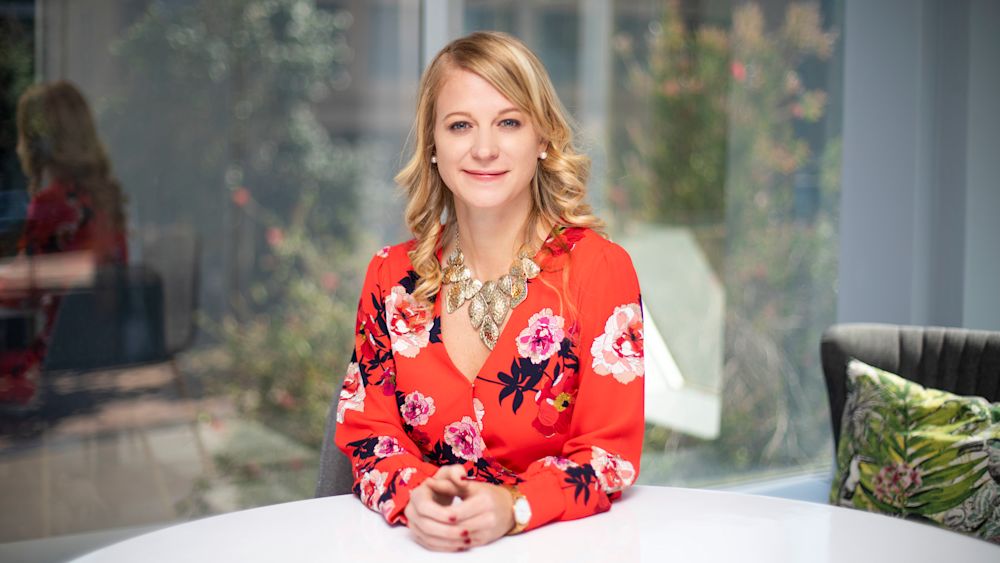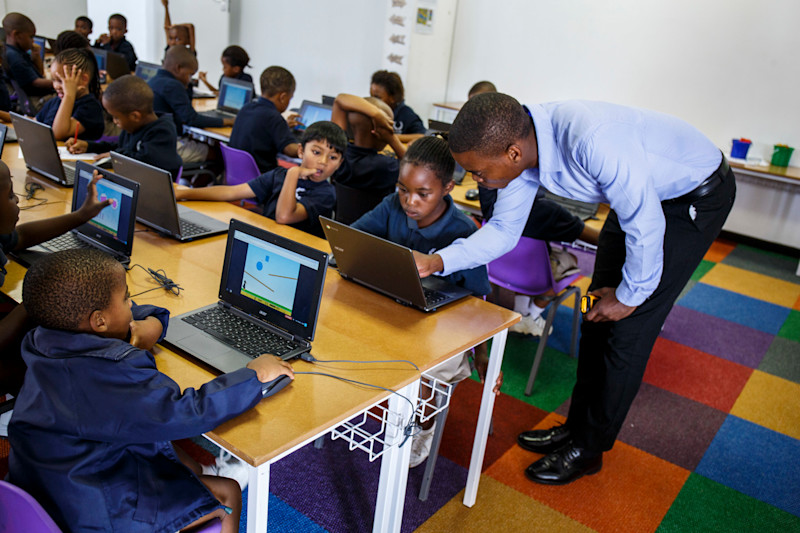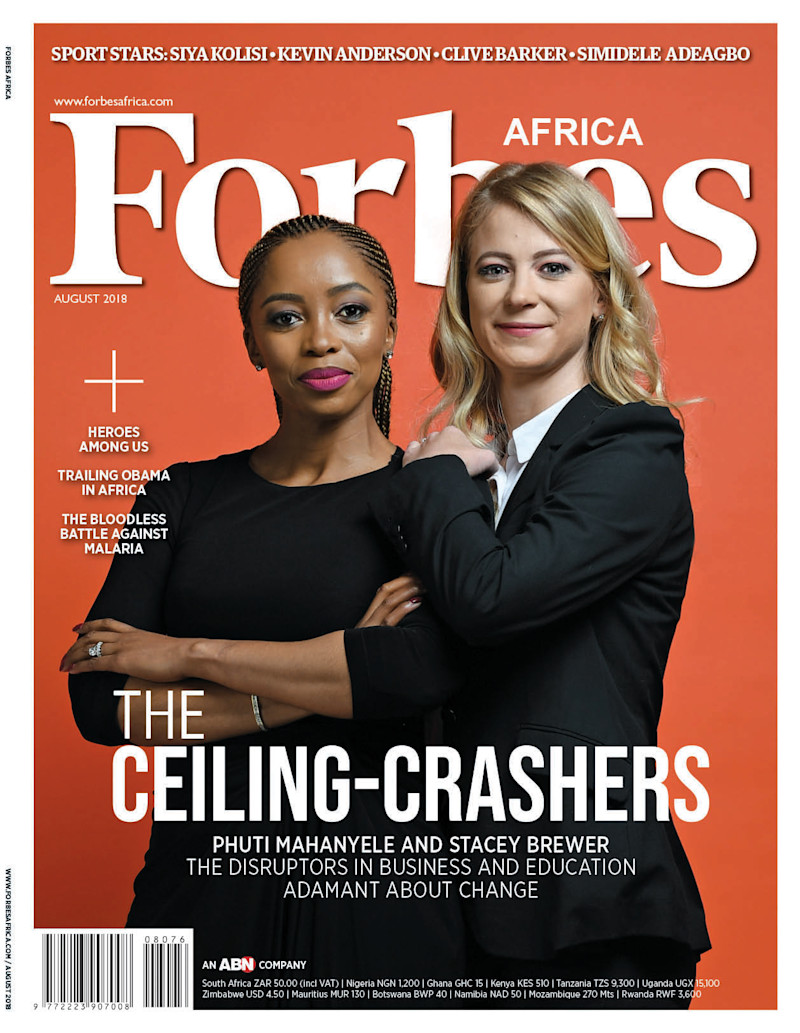- Iterate
- Meet the team
- Meet the Ed-Tech Entrepreneur Who Pioneered Blended Learning in South Africa Profitably
Meet the Ed-Tech Entrepreneur Who Pioneered Blended Learning in South Africa Profitably
Stacey Brewer was sitting in her macroeconomics class at the Gordon Institute of Business Science when her lecturer challenged students to find a way to tackle the unending issue around the quality of education in South Africa. She later co-founded Spark Schools, a network of private schools offering affordable, globally competitive education. The Org talked with Brewer to learn about her story.

Ten years ago, Stacey Brewer was sitting in her macroeconomics class at the Gordon Institute of Business Science when her lecturer challenged students to find a way to tackle the unending issue around the quality of education in South Africa.
Brewer, who was studying for her MBA in Entrepreneurship, took on the challenge by deciding to focus her studies and thesis on the matter. Her desire to find a way to provide affordable private schooling in South Africa led her to co-found SPARK Schools in 2013. SPARK Schools has gone on to become the third largest network of independent schools in South Africa, and its schools are the first educational institutions in Africa to offer blended learning to primary school children.
South Africa has fared poorly across several benchmarks that rank the quality of education. The World Economic Forum’s 2020 Report on Social Mobility ranked South Africa 80th out 88 countries for the quality of education and education access relative to other developed and emerging economies. The most glaring problem for Brewer was that over 5% of South Africa's GDP and 20% of the national budget spend goes towards education, but that hasn’t translated to better outcomes.
“There was a recent PIRLS assessment outlining how 78% of 4th grade students in South Africa cannot read for meaning, whereas most of the kids in developed countries are reading by the time they get to Grade R,” Brewer said. The other glaring gap was the inequality in the system, where few children whose parents could afford private schooling were receiving the best education that money could buy, meanwhile many students in the public school system were falling behind, she said.
Brewer co-founded SPARK Schools to offer high quality education in line with international standards at the price point of government schools. The schools benchmark their literacy levels against the U.K., and use Singapore as a benchmark for mathematics.

The schools’ blended model of learning focuses on the context in which a child learns versus just the content. Students split their time between classroom lessons with a teacher and a learning lab that leverages technology, using adaptive software to reinforce what was learned in the classroom. Data gathered both in the classrooms and in online programs is used to generate reports on children’s academic achievement to identify learning needs. Each term, the data is used to develop a teaching strategy and students can often be regrouped based on their competency levels in each subject area.
Brewer and her Co-founder Ryan Harrison liaised with Rocketship Education, the pioneers of blended learning in the U.S. “They were interesting to us because of their use of technology and that they catered primarily forlow-income communities with second language english speakers, and their ability to scale,” Brewer said. The pair took many of Rocketship Education’s best practices and localized them for the South African environment, but have expanded on the model significantly since inception.
Their first school started with 165 children and 20 staff members. Now, they are currently operating 18 sites and educating more than 13,500 children, while employing more than 1,000 staff members. “Our big focus was on primary schools when we started but saw a demand for high school, so we developed an offering three years ago and will be opening up another high school in 2023,” Brewer said.
The company closed a Series C funding round in 2020 with three large investors who will enable the entity to grow from 18 sites in 2021 to 45 by 2026, while focusing on South Africa and are considering cross-border expansion. Choosing to run the schools as a for-profit model, when most similar low-fee schooling models are non-profits, has been key to Spark’s success. Brewer mentioned how she focused her MBA thesis on a sustainable financial model for low-fee private schooling.
“I found that most entities that ran similar education models were having to raise funding each year or would change their mission to fit within funding mandates,” she said.“In the non-profit world donors could fund you year-to-year versus with investors you are raising capital from people who are expecting some level of return over a long period of time.”
Brewer wanted to build an entity that was self-sustaining and could provide slightly below market returns to investors but with a social impact element, which tends to be attractive to capital in the long term.
SPARK Schools’ initial investment came from local high-net-worth individuals in South Africa who were backing the jockeys and took a long-term view. Most of the capital raised for the company’s growth has come from international investors, with Brewer saying they found the local investor base to be more risk averse and seeking more guaranteed returns, and that there were constraints around the number of rounds local investors could fund. In Brewer’s view, the best thing was to attract investors that could fund multiple rounds, given startups tend to need funding every 12-18 months, and who would develop a consistent shareholder base.

SPARK Schools operates on a normal tuition fee model. What differentiates it from competitors ADvTECH and Curro is its learning model and that it is not listed on the Johannesburg Stock Exchange. Brewer said the key driver for the company’s growth was the dire need for affordable quality education. “There are not a lot of players offering our value proposition, but we know that Curro is trying to enter the market offering education between the $1,800–2,500 USD range as well,” Brewer said. She believes the impact of COVID-19 on families’ disposable incomes is driving many to look at more affordable education options for their children.
Brewer shared the lessons that have come as SPARK Schools transitions from being a startup to a scale up, and said the most important one was to get people, systems and processes in place to ensure there was a strong foundation for the next stage of growth. The company has reevaluated its governance structures and reconstituted its board to have the best people driving SPARK Schools’ mission and vision as its shareholders, board members and executive team. Belonging to industry support networks like Endeavor and the Young Presidents Organization has also proven to be valuable as the business scales given the networks and resources provided by these forums, Brewer said.
“We want to continue serving on our promise to our families across the country and ensure that our scholars have an opportunity to access a tertiary education path they choose to follow,” Brewer said.
“Over time we want to work closer with the government, by having more collaboration between the public and private sector and see growth prospects cross borders in Africa.”
--
The Org is a professional community where transparent companies can show off their team to the world. Join your company here to add yourself to the org chart!
In this article


The ORG helps
you hire great
candidates
Free to use – try today
